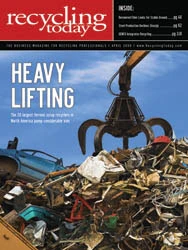NERC Updates Recycling and Reuse Industry Study
According to a new study released by the Northeast Recycling Council Inc. (NERC), Brattleboro, Vt., recycling and reuse fuels a $35 billion per year industry in the states of Delaware, Maine, Massachusetts, New York and Pennsylvania. The research, which updates NERC’s 2000 Recycling Economic Information (REI) Study, found that more than 11,000 recycling and reuse businesses employ more than 100,000 individuals in the five-state region and pay in excess of $4.2 billion in wages.
Each year, recycling operations in the five states save the amount of energy needed to power almost 2 million households, avoiding 6.4 million tons of greenhouse-gas emissions, the equivalent to taking close to 3 million cars off the road, according to NERC.
DSM Environmental Services Inc., Windsor, Vt., and MidAtlantic Solid Waste Consultants, New Market, Md., prepared the study for NERC and the five participating states. The study incorporates several changes to the methodology that was used in the 2000 Recycling Economic Information Study to examine the economic impact of the industry, NERC Executive Director Lynn Rubinstein says.
"The changes were designed to more accurately estimate the economic contribution of the recycling and reuse industry in the five participant states for the year 2007," Rubinstein says. "Those changes also make it difficult to compare the studies to one another."
Some of the changes came in response to industry concerns regarding the methodologies used in the earlier report. For example, Rubinstein says, "the updated study reports economic data for the recycling industry separate from economic data for the establishments that purchase secondary materials from the recycling industry. These establishments were labeled ‘demand side’ activities in the 2000 report and were included in ‘recycling industry’ data. In the new study, the demand-side industries are listed separately as ‘recycling reliant’ industries."
In addition to this change, the new study allocates recycling economic activity only to the portion of the demand-side consumer’s use of recycled materials. For example, if a pulp mill uses an estimated average of 25 percent recycled fiber, then 25 percent of employment, payroll and gross receipts is allocated to recycling.
The study update also reports on the indirect and induced economic impacts of the recycling industry on a sector-by-sector basis. However, unlike the 2000 report, the new study does not add the indirect and induced effects to the direct economic impacts to calculate the total contribution of the recycling, recycling reliant and reuse and remanufacturing industries in light of concerns about double counting.
The study divides recycling into 26 categories. Six of the categories represent the supply chain that provides recycled raw materials to manufacturers, including municipal and commercial collection programs, sorting facilities, composting operations, scrap wholesalers and plastics reclaimers. The study found that businesses that use recycling raw materials do so in lieu of "virgin" products that are often mined and manufactured outside of the region. As a result, these businesses create jobs closer to home and have a smaller environmental footprint than companies that rely on raw material extraction, according to NERC.
The report is available at www.nerc.org/documents/recycling_economic_
information_study_update_2009.pdf.
Oregon Posts Increase to Rigid Container Recycling Rate in 2007
The Oregon Department of Environmental Quality (DEQ) reports that the aggregate recycling rate for rigid plastic containers in the state for 2007 increased slightly to 30 percent from the 28 percent rate achieved in 2006.
The DEQ has posted its full report, "Oregon’s Rigid Plastic Container Recycling Rate for 2007 and Determination of the Recycling Rate for Compliance Purposes for 2009," to its Web site, which can be accessed at www.deq.state.or.us/lq/pubs/docs/sw/
RPC0709Report.pdf.
The report concludes that the increase in the recycling rate is largely in light of increased diversion through curbside recycling programs, as communities moved from collecting their recyclables in bins to wheeled carts. Plastic tubs, pails and flower pots were also added to the list of acceptable plastic containers. The report also notes that sales of soft drinks and returns of soft drink containers have declined in 2006 and 2007, though the market share for water and juices have increased.
The DEQ also forecast further increases in the curbside recycling of plastic containers in 2008 and 2009, as Portland and other portions of the state finish switching to larger wheeled containers for collecting recyclables.
The Oregon Bottle Bill was also expanded Jan. 1, 2009, to include plastic water bottles.
Canusa Hershman Recycling of Virginia to Open New Plant
Canusa Hershman Recycling of Virginia is nearing completion of its newest facility, a single-stream material recovery facility (MRF) in Manassas, Va., a densely populated area west of Washington, D.C.
The facility includes a Bollegraaf system and three optical sorting units. Jonathan Sloan, president of Canusa Hershman Recycling Co., says the state-of-the-art system will allow the company to meet quality specifications required by its end consumers.
At full capacity, the MRF will be able to process approximately 50 tons of material per hour. Canusa Hershman Recycling planned the facility so additional capacity could be added in the future if necessary.
The company operates four processing facilities in Vermont, New York, Maryland and Virginia, which is a joint-venture operation.
Canusa Hershman Recycling of Virginia is a wholly owned subsidiary of Canusa Hershman Recycling Co., which has corporate offices located in Baltimore and Branford, Conn.

Explore the April 2009 Issue
Check out more from this issue and find your next story to read.
Latest from Recycling Today
- Aqua Metals secures $1.5M loan, reports operational strides
- AF&PA urges veto of NY bill
- Aluminum Association includes recycling among 2025 policy priorities
- AISI applauds waterways spending bill
- Lux Research questions hydrogen’s transportation role
- Sonoco selling thermoformed, flexible packaging business to Toppan for $1.8B
- ReMA offers Superfund informational reports
- Hyster-Yale commits to US production





